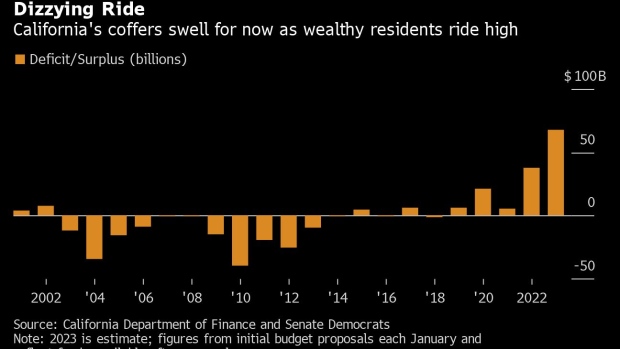May 11, 2022
California’s Newsom to Decide How to Spread Wealth From the 1%
, Bloomberg News

(Bloomberg) -- California Governor Gavin Newsom is in the enviable position of having what could be a $68 billion budget surplus to bolster the world’s fifth-largest economy. But how he uses the windfall is becoming increasingly fraught.
Soaring inflation and record gas prices are squeezing residents. Abortion rights are likely to be rolled back in conservative states, making California a haven. Turmoil in financial markets and the prospect of an economic slowdown mean bond investors want to see more money set aside for potential dark days ahead.
The Democratic leader, up for re-election this year, is set to present his revised budget Friday grappling with these mounting challenges on top of perennial California crises such as homelessness, soaring costs of living and the effects of climate change. Even as tax collections exceed expectations -- Senate Democrats project a record $68 billion surplus -- he’ll have to navigate the difficult task of addressing concerns of residents, legislators and investors.
State officials across the country are rushing to ease the pain of inflation, but it’s particularly acute in California, home to the country’s most expensive residential markets and some of the highest gas prices in the US. Newsom’s already proposed sending debit cards to car owners, while lawmakers are pressing for a broader program of taxpayer rebates.
Bond Buyers
Meanwhile, Newsom is facing a barrage of spending proposals from Democrats who control both legislative chambers, including more to support abortion rights with measures such as a fund providing financial assistance to those seeking care.
At the same time, investors in municipal bonds -- California is the biggest such issuer-- are watching to ensure Newsom doesn’t over commit resources. The state’s lopsided tax structure, in which the top 1% of earners pay nearly half of personal income-tax collections, also sets it up for revenue to plummet severely in an economic downturn. Some economists expect growth to slow next year as inflation takes a toll.
“We want to make sure that states are being conservative, both in terms of surplus use and assumptions for next year,” said Jennifer Johnston, director of research for Franklin Templeton Fixed Income’s municipal bond team. “So we don’t want the state to get locked into anything that they can’t fund on a going forward basis.”
Newsom needs to show residents he’s hearing their concerns. Asked about their fiscal situation in the coming year, more voters anticipate their finances to be worse than those expecting them to be better, according to a poll released last month by the University of California, Berkeley’s Institute of Governmental Studies.
With midterm elections on the horizon, Republicans are blaming higher inflation on Democrats and President Joe Biden. “No matter how hard they try to distract, Biden and Newsom own this crisis,” said Assembly Republican Leader James Gallagher in a statement.
Double Edged
Inflation holds both benefits and drawbacks for states: it spurs increases in sales tax collections, but also can raise costs for labor and construction projects. Newsom’s presentation Friday will show which scenario will dominate for the state, said Craig Brandon, co-director of municipal investments at Eaton Vance Management.
“Inflation is a dual-edged sword,” he said. “It can drive revenues higher, but at the same time drive expenses higher.”
In 2021, when Newsom was facing a conservative-led recall election, he touted a $100 billion economic recovery plan funded through federal stimulus dollars and a then-record state surplus of $38 billion. The Democrat emerged even stronger -- 62% of the electorate rejected removing him -- and faces no challengers from his party or anyone with statewide name recognition this year in his bid for a second term.
The timing of his latest budget may be opportune as people will this week start to receive their mail-in ballots for the June primary. As leader of the party, Newsom can help other Democrats grappling with competitive races, said Melissa Michelson, a political science professor at Menlo College.
“It would make a huge amount of sense politically for him to do something that makes a lot of voters happy, right when they have to go decide whether they want to keep Democrats in control of the state,” she said. “It’s a very strong message to give out just when folks are getting ready to vote.”
©2022 Bloomberg L.P.






